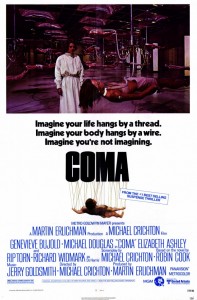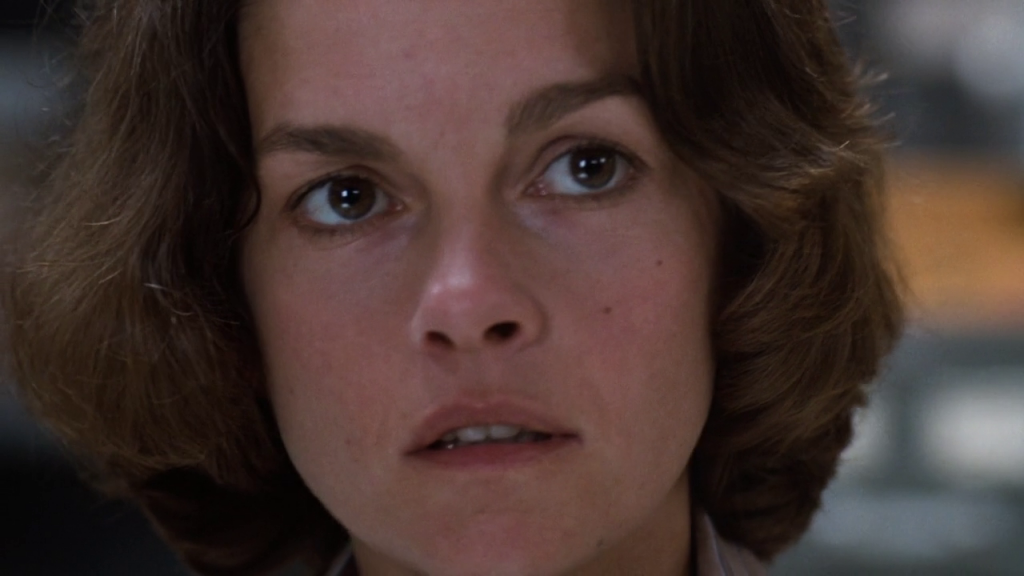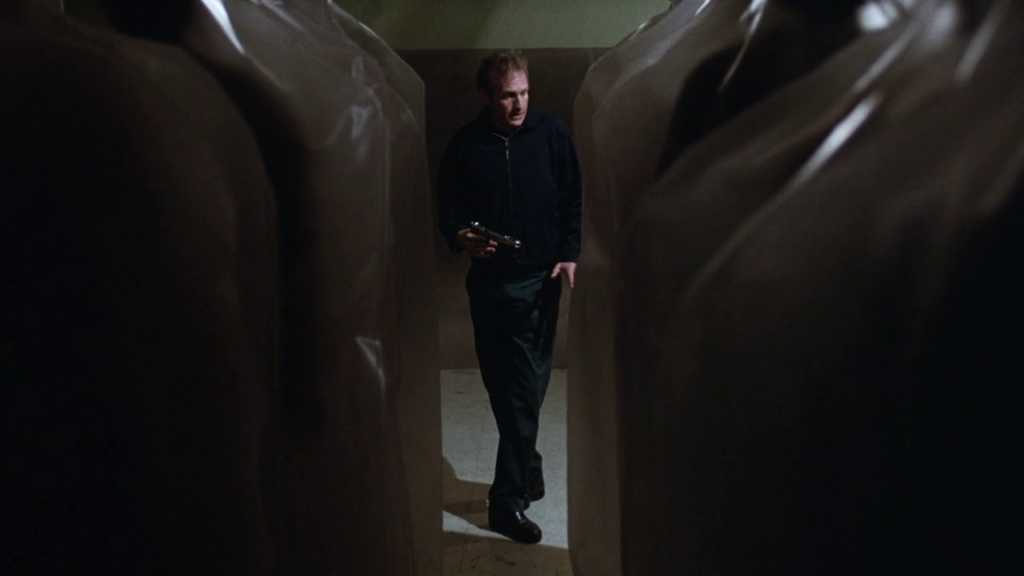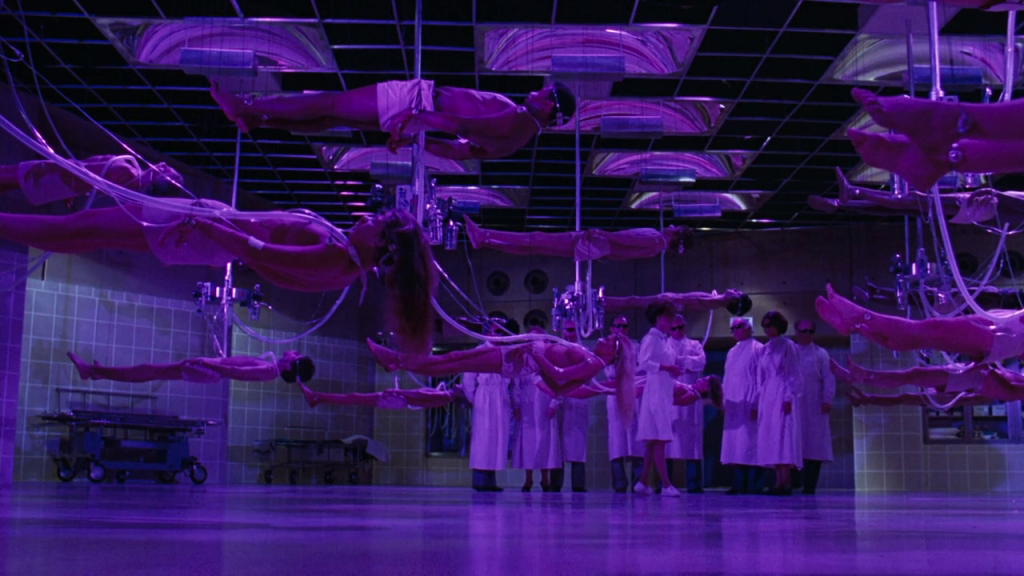|

Synopsis:
When her friend (Lois Chiles) goes into a coma during a routine operation, a medical resident (Genevieve Bujold) begins an investigation that causes everyone around her — including her boyfriend (Michael Douglas) and supervisor (Richard Widmark) — to worry she is becoming neurotic and unbalanced; but she quickly learns her concerns are legitimate, and struggles to get anyone at all to believe that healthy patients at her hospital are being deliberately killed and sent to an institute for unknown reasons.
|
|
Genres, Themes, Actors, and Directors:
- Amateur Sleuths
- Doctors and Nurses
- Genevieve Bujold Films
- Michael Douglas Films
- “No One Believes Me!”
- Richard Widmark Films
- Rip Torn Films
Response to Peary’s Review:
Peary writes that this “Nancy Drew-like murder mystery” — “based on Robin Cook’s best-seller” — offers French-Canadian Genevieve Bujold “her best role in an American film” as Dr. Susan Wheeler, “an unusually appealing heroine”. He notes that the film itself “is a real nail-biter”, with director Michael Crichton putting “us in a setting where we should feel secure… and suddenly things go wrong”. Indeed, it’s genuinely freaky how plausible a scenario like this one actually is, given that we have little choice but to trust that doctors have our best interests at heart, and to accept tragic “accidents” as part of the price we pay for the advantages of modern medicine. Without unusually plucky and persistent people like Dr. Wheeler, how would we find out what our supposed medical saviors are up to?
In his review, Peary writes that while the “hospital atmosphere and operation-room scenes” are “very true to life”, “you’ll have to suspend your disbelief at every turn” — which is somewhat true but not really a problem, given how innately appealing Bujold is. (Cinematic heroines almost always manage to discover elusive information and escape by the skin of their teeth, don’t they?) Meanwhile, I disagree with Peary’s assertion that the “dialogue relating to Bujold being a woman in a man’s world” is “now trite”: regardless of how gender relations currently function in modern hospitals (and I’m sure they’re still far from ideal), there is no doubt that female doctors in the 1970s dealt with many of the patronizing and sexist attitudes Dr. Wheeler faces but refuses to accept.
Note: Watch for Tom Selleck in a pre-“Magnum, P.I.” role as a doomed patient and Ed Harris in a small role as a pathology resident.
Redeeming Qualities and Moments:
- Genevieve Bujold as Dr. Wheeler

- Many tense, exciting scenes

- Excellent sets

Must See?
Yes, as an enjoyable and gripping thriller.
Categories
Links:
|




2 thoughts on “Coma (1978)”
Danny Peary missed the mark when he said Coma is “probably… Crichton’s most enjoyable film”. That distinction belongs to Westworld by a country mile both in concept and execution.
Setting that aside, Coma is entertaining in its own right. Its most terrorizing moment occurs early on: it pivots without music from the inter-office politics it seemed intent on exploring, to a routine abortion ending unexplainably in a brain dead patient, who happens to be Lois Chiles’ character we were just introduced to.
The subtle touch allows the viewer to absorb the narrative and realize their worst fears on their own. Furthermore, the decision to wait to incorporate Jerry Goldsmith’s music score until later in the film was an inspired choice. Crichton noted this decision as being Goldsmith’s on the liner notes to the soundtrack album: “There is no scored music at all during the first hour of “COMA”, and very few sequences without music thereafter. At the same time, he wanted to eliminate music in certain highly dramatic moments…”. His score is mostly superlative here.
It is interesting to note that the creepiest role in this film belongs not to any of the conspiring male cast, but to Elizabeth Ashley’s performance as the dehumanized spokesperson and head of operations at the Jefferson Institute. As she parrots the institute’s exploitation for a buck masked as cost-effective care for the comatose, we’re reminded that it is still chillingly a fresh topic nearly forty years on.
Must-see, as a successful example of a suspense thriller. It would likely hold interest for more than a single viewing. I’m in agreement with the main assessment here – and follow with what I posted in ‘Film Junkie’ on facebook:
“There’s an unauthorized woman in the building.”
‘Coma’ [streaming on FilmStruck]: Here’s another film that I hadn’t seen since its initial release – and was curious to see if it has held up over the years. And I think it has. One might think that – with the advancement of science and technology – a suspense thriller set in a hospital might somehow come off as ‘quaint’. But the premise of ‘harvesting’ remains relevant and scary. ‘Coma’ belongs to that sub-group of ‘paranoia films’ that we seemed to see a bunch of from the late ’60s to the late ’70s (‘The Conversation’, ‘The Parallax View’, etc., etc.). As the years go by, the validity of paranoia seems to have grown. ‘Coma’ could easily bring to mind certain realities about the medical profession that, while somewhat similar, don’t directly correlate to the film – though, for example, the film does brush on the idea that patients will easily accept what doctors say as gospel… when questioning might not be a bad idea. I found this viewing a rather gripping one. The leads (Genevieve Bujold and Michael Douglas) turn in solid performances – and I especially like Jerry Goldsmith’s eccentric yet effective score; it’s very sensitive to the needs of the storyline as tension mounts.